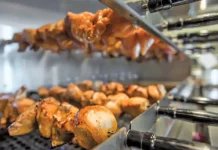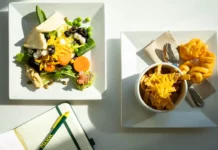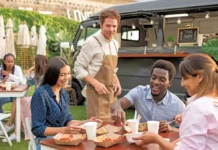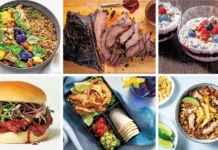Chef & Host of Bizarre Foods America on the Travel Channel
Andrew Zimmern has done it all. An American television personality, chef, food writer, and teacher, he is the co-creator, host and consulting producer of The Travel Channel series Bizarre Foods with Andrew Zimmern, Bizarre Foods America, and Andrew Zimmern’s Bizarre World. But don’t think his food is just bizarre. He was presented the James Beard Foundation Award in 2010. And if you think that’s not enough, he’s also now the host of Dining with Death, about foods that can kill you.
What brought you into food service at the tender age of 14?
Actually I was 4! At least in the sense that my parents and just about everyone knew that I was going to be in the food business. I had a lot of precocious comments about food. Food was very important to me. I wanted to help my parents cook. I wanted to go and eat at certain restaurants with my parents. I just loved food!
Were your parents a little embarrassed by you?
You have to remember this was 1965, 1966, and I’m 5, 6 years old. There were not a lot of precocious food brats then, like you have them today. My son is a very precocious food brat, but he’s growing up in a much different food environment, and a much different household.
So how do you define a precocious food brat?
I was very into food, so by the time I was 14, and I saw all the other kids, wanting to work — we had to get summer jobs – and they all wanted to work at the landscaping place and dig ditches and mow lawns all day. I wanted to be at the beach all day long and working restaurants at night. I thought it was the best possible combination you can have. I set foot in a restaurant, the Quiet Clam in East Hampton, Long Island, and I just wanted to be in restaurants the rest of my life.
So then you went to Vassar.
You know, my father, and others, had instilled in me the idea that it would be good for me to learn how to read, write and think. I chose a major, history. I loved the story telling of it, the implications of it. So I majored in history and art history, and it was, in my art history class – I didn’t see it at the time, but looking back, it’s very evident to me. . . Well let me work it backwards for you. I firmly believe I can look at a bowl of soup and tell you the story of a people. That sort of became a turning point. I don’t think I ever looked at food the same way when I got out of college.
And then what?
I’d been cooking summers while I was in college. I took a semester or two off and traveled abroad and was a stagiaire in Europe and other places to learn about food. And I came back to New York and I was obsessed with the stories of food, ever since that art history class, I became convinced that food was great, but food with a story was even greater.
How did the restaurants you worked at early on affect your career choice? Who mentored you, and had an impact on you?
When I was in high school, one of my godparents got me a job working one night a week for Leslie Revson at a restaurant called 1/5 that was at 1/5 Avenue. I worked there one night a week but the lesson I learned there I’ve never ever forgotten. You have to remember this is 1977, ‘78, and I was doing desserts one night on the cold side and there was some ice cream, a little piece of caramelized upside down cake, some sliced pieces of roasted pineapple on this little plated dessert, and I remember it was one of the few times I interacted with Leslie, who’s now passed away, and I asked about the crab.
Why wouldn’t they pour it over in the kitchen, wouldn’t it be easier to set it up that way? And, she said no, I want the diner to make a decision at the table. I want to engage them in making an act, it’s like dipping a French fry in ketchup or putting a piece of meat or bread into fondue, you know. It’s to engage the diner to make a decision at the table, how much sauce, where they’re going to drizzle it, all that stuff. She says that is the stuff that creates relationships with restaurants. Between the eater and the food. I never forgot that, and it became my motto. I try to create food my whole life that engaged people that way. You can’t do it with every dish, but it’s one of those things that I never forgot.
Then there was Arcadia, my first serious restaurant where I got to see the inner workings up close. The longest stint that I did was at Petaluma and Elios. Anne Isaac and Ellio Guatalini. I learned more from Ellio Guatalini, just hanging out and listening to him talk about how restaurants should be run than any other human being I’ve ever encountered.
What did you learn?
The notion of simplicity. I mean, here was someone who believed in classic Italian cooking, which meant a respect for seasonality or respect for a limited number of ingredients in the plate, honesty and authenticity and showing that it wasn’t going to be boring. It taught me that the most important person in the restaurant is not the chef, it’s the customer.
What came next?
Then I worked for Steve Hanson for four or five years, actually, with him as well as for him. I was the first business hire for Steve and his partners, before we created Coconut Grill. Did I know he was going to be such a success? I knew it the moment I spent my first day working with him. I learned things I will never, ever forget with him.
What was it you saw that stuck with you about him?
He understood what goals were and how to work towards them. The first day I met him he said, I want to have 25 restaurants. He literally described, 20 years before he got there, where he was going to go and how he was going to get there. He taught me the value of over-preparation. Information to Steve is everything. The more information you have, the more good business decisions you can make. Who your diners are. What they’re ordering, why they’re ordering it, at what time, at what table, with what server?
Here’s one of my favorite Steve Hanson stories. We bought the space that is now Isabella’s up 79th and Columbus, and in those days nobody was doing late night dining on the Upper West Side. And Steve said, “We’re going to stay open, we’re going to serve food until 1:00 in the morning. Or 2:00 in the morning.” Everyone thought he was crazy. So at 10:30 every night or 11:30 on Fridays and Saturdays, the last diners would leave the restaurant. And, Steve would have the waiters stay in their stations, and then he would have them rotate and stand in those glass French doors, facing out onto Columbus, and he wanted people as they were driving uptown to see that there was a restaurant that was still open. He kept saying, we’re going to be open, we’re going to keep the lights on, and people will eventually stop by. And he was right. He basically created that segment of the business for us just with his ferocious tenacity and stubbornness.
So is ferocious tenacity and stubbornness part of what you brought to your ventures?
I admire that in people. I admire singleness of purpose. I admire dedication to a principle. I admire principled people above all other things. Some folks have problems with very strong personalities, and Steve was a very strong personality. I respond very well to that, and I would imagine that people would describe me as a very strong personality. I admire principled people who have a vision and stick with it.
So, do you think that’s all it takes to succeed?
Of course there’s natural talent and ability in the mix, too. Some people ride that out. Some people ride out luck. Some people are born on third base. There are lots of different ways people are successful.
You’ve battled some addictions in your life. Was it the stress of the industry?
Now, the industry doesn’t create alcoholics and drug addicts. Alcoholics and drug addicts create themselves. The restaurant industry is like a lot of other industries. It’s an easy place to hide out if you have an addiction. But every day at the accounting firm, people turn out the lights and then enjoy themselves, too. In restaurants there is a camaraderie that revolves around drinking. We’re pushing, pushing, pushing, and that the release needs to be celebrated at the end of the night. It’s even more serious in the restaurant industry now than when I started in it.
But it’s not all bad. It’s still a place where people with some problems like that can hang out. I was doing brunch at some middling restaurant and they should’ve fired me. I was late every single shift but they kept me around because I could put out 200 plates of eggs in an hour and a half.
What about the impact that Hazelden had on your career.
Well, I learned a different way of living. I’ve stayed sober now for 21 years and along the way I’ve learned some very valuable principles that I think have allowed me to become a much better person, and to be more of a citizen of the world.
Let’s talk about the idea for Bizarre Foods.
It’s not about me eating weird stuff. It’s about teaching people not to practice contempt prior to investigation, to be open-minded, to be patient, tolerant, and understanding of other cultures and other people. My goal with Bizarre Food is to let people know that we can have more conversations about the things we have in common, like our love of food, than the things that divide us, like skin color, religion, politics, sexuality, and all that other nonsense. And that’s from becoming a sober person.
Was Hazelden the reason you ended up in the Twin Cities?
I did an intervention the early evening of January 28th, 1992, and got a one-way ticket out here, and haven’t left.
But can a New Yorker find happiness in a diner?
Absolutely! They have good Chinese food out here. That’s all I need.
You had a great run at Un Deux Trois in the Twin Cities. What did you take away from your experience there?
The restaurant opened two weeks before I started working there. I was living in a halfway house in St. Paul. I was washing dishes at a coffee shop, and I had no idea the restaurant had opened, but I knew the French partners from my days in New York, George and Girard. They had a house in Sag Harbor and I had bumped into them out there. So I knew who these guys were. And I thought to myself, well I can go there. My plan was to wash dishes there for a couple months and then go back to New York. I showed up two weeks into their opening. The place was insanely busy, beyond busy. No one had ever opened a restaurant like that in the Twin Cities before. It was the same menu they did in New York City. And it was a huge monster hit.
Did you really work there as a busboy?
Well, I applied for a job as a busboy and a dishwasher. I got the job. Nobody knew who I was there, in terms of being a pretty serious accomplished food professional from New York. I guess I’d been there about four days, and one of the line cooks didn’t show up for lunch, and I had watched as a busboy and a dishwasher, you get to see the cooks putting out the foods, and his station wasn’t that tough, and I knew that I could do it.
So I told them you know, I volunteered, and it’s a great story. One of the favorites of my life. And I put out the guy’s station at the end of the shift. The managing partner then called me into his office and asked me how it was that this busboy and part-time dishwasher just put out such an incredible meal, that looked better than what his chef was putting out, and I wasn’t going to lie to him. I just wasn’t going to offer information. And, he interrogated me successfully. And within, 3 weeks, 4 weeks, I was the new chef in the restaurant. Within a couple of months I had replaced the old chef’s staff and we recreated the restaurant.
The French partners from Un Deux Trois in New York City decided they didn’t want to have anything to do with running a restaurant in Minneapolis. So financial arrangements were made and I was made an offer to sort of run the place with one of the managers.
And over the next five years, we changed the menu, we created more of our own signature French restaurant there, but we had the first raw bar in the Twin Cities. Wednesday night we did French Vietnamese food because I wanted to do something interesting in the middle of the week, again incorporating travel and food with a story.
We did holiday meals there, everything from Christmas lunches to second night Seders. It was an amazing restaurant and in its time was considered one of the best restaurants in the Twin Cities. I left there because I was ambitious. I wanted to do more. And I thought that the media swimming pool would be one that I could jump into, but after a while they were going to whistle kids out of the pool and I’d better get in there in a hurry.
What gave you your break in TV? How did you rebuild — or create – your brand?
I went to a TV station; a radio station and a magazine and I offered to work for free. I figured eventually one of them would offer me a job and all three did! So I started doing TV on the local Fox News affiliate. And when regional or national TV shows came in, like an HGTV, years ago they would ask me to guest on it, or, oh, could you cook the food for this segment of the show or that cable show, and I said, sure. And I built a reel, and then I went around and sold myself, and it really was as simple as having a good idea.
The production company that partnered with me went to The Travel Channel in New York City and sold them the idea of doing the show. They commissioned a pilot, some specials, and some stuff that never saw the light of day, because, they wanted to test and measure different styles of how we might do this show. And, 10 years ago, they bought the show.
Then what happened?
We started making it, and 8 ½ years ago, the first one of the specials aired, and they tested and measured those and ended up commissioning more shows, and thanks to the viewers it’s a successful program.
Would you say that in many ways there’s been this enormous growth in terms of food TV and that’s your niche?
I was lucky. I found a place that my skill set was perfectly suited for.
With so many people now watching food television, has the bar been raised in terms of what a restaurant needs to do in performance on a night-to-night basis?
It’s not just because of food TV, but food media has created a more food-aware customer than ever before. I mean, there’s people who have never tasted certain types of wine who could tell you what it goes with because they watch a lot of television and listen to smart people talking about it. There are people who’ve only eaten five or six different types of mushrooms in the world, but they can talk about 25 of them because they’ve seen it on TV. They’ve read it in magazines. I mean, we’re inundated with so much food information it’s unbelievable how much smarter and food-savvier people are today.
Sure, that puts a lot of pressure on restaurants. And I think there are more good restaurants now because of that. I think they feed on each other. Consumer demand and restaurants delivering a high-quality product have never been so intertwined. They drive each other.
What about the pressure this puts on the CIAs and the Johnson and Wales of the world to produce a high-quality, productive, creative chef?
Those schools have never done a better job. It’s amazing how fully realized the education is for young people going to culinary schools today, especially the good ones. They’re putting out more graduates than there are jobs! But I don’t think that’s a bad thing. After all, not everyone who graduates from these schools is able to become the next Grant Achatz. Many of them will make hotel food better. Many of them will go to work for Fortune 500 food companies and make commercial food better. Many of them will become entrepreneurs and come up with the next cool potato chip. These schools are putting out smart culinarians into the food world.
And, it’s not just restaurants, like in the old days, where people would go to hotels and restaurants for great food. Now they’re going into all kinds of different places. Some will start the next great winery or beer hall.
What’s ahead?
I’m going to be making more television and I’m dying to get involved in a couple of new projects. I’m going to keep making Bizarre Foods as long as the viewers want it. We just came off one of our best rating seasons ever. So I’m very excited about the growth of the show. And I’m very excited about some new things that I can do because of that. And, I’m always writing. The next thing I’m going to do is a cookbook. I just started a sausage company with Pat LaFrieda. That’s very exciting to me.
You know, project after project, restaurant after restaurant, those of us in the food industry are successful because they understand what their consumer wants, and they have the patience and understanding to make their businesses last.
To learn more about Andrew Zimmern, visit his website.
























Comments are closed.